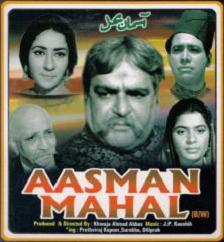 W
WAasman Mahal is a 1965 Hindi social family drama film directed by K. A. Abbas. Produced for the "Naya Sansar" banner, its story was written by Abbas, and the cinematographer was Ramchandra. The script and dialogues were by Inder Raj Anand. Prithviraj Kapoor's role as the impoverished Nawab, was acclaimed in the film for its "authenticity". Dilip Raj, son of P. Jairaj, played the hero, having earlier acted in Shehar Aur Sapna (1963). The other co-stars were Surekha, David, Nana Palsikar, Anwar Hussain.
 W
WAnhonee is a 1952 Indian Hindi-language psychological drama film directed by K. A. Abbas. The film stars Nargis in a dual role alongside Raj Kapoor in the lead, supported by Achla Sachdev, Om Prakash, Agha and David Abraham in other prominent roles. The film had music composed by Roshan, while the lyrics were written by Ali Sardar Jafri. Nargis was highly appreciated for enacting a dual role and her performance garnered critical acclaim. Abbas attempted to explore two concepts – Geneticsm and Determinism, a theme which he experimented in Aawara (1951).
 W
WChar Dil Char Rahen is a 1959 Hindi film directed by Khwaja Ahmad Abbas, and starring two big stars of the era, real-life brothers Shammi Kapoor and Raj Kapoor. The movie is based on a novel of the same name.
 W
WDo Boond Pani is a 1971 Hindi social drama film produced and directed by Khwaja Ahmad Abbas. Made under the "Naya Sansar" banner; the story, screenplay and dialogues were by K. A. Abbas, with additional dialogues by Inder Raj Anand. The music was composed by Jaidev. The cast included Simi Garewal, Jalal Agha and Madhu Chanda and was the debut film of actor Kiran Kumar. The film won the award for Best Feature film on National integration.
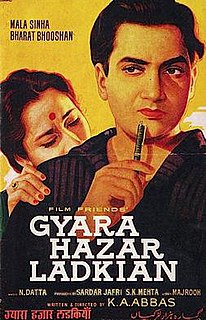 W
WGyara Hazar Ladkian is a 1962 Hindi romantic social drama film directed by K. A. Abbas. The film was co-produced by the poet Ali Sardar Jafri, who also helped co-write the story with Abbas. Produced under the Film Friends banner, it had music by N. Datta. The director of photography was Ramchandra. The cast included Bharat Bhushan, Mala Sinha, Murad, Nadira and Helen.
 W
WJourney Beyond Three Seas is a 1957 film jointly directed by Khwaja Ahmad Abbas and Vasili Pronin. It was made in two versions, Hindi and Russian, and is based on the travelogues of Russian traveller Afanasy Nikitin, called A Journey Beyond the Three Seas, which is now considered a Russian literary monument.
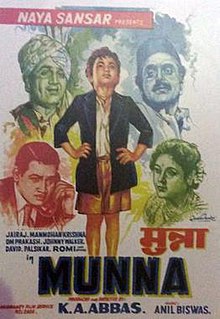 W
WMunna also called The Lost Child is a 1954 Hindi social drama film produced and directed by K. A. Abbas for the Naya Sansar banner. The story was written by Abbas with photography by Ramchandra. The music director was Anil Biswas though there were no songs in the film. Master Romi played Munna and the actor Jagdeep appeared as a child artist in the film. The rest of the cast included Sulochana Chatterjee, Shammi, Tripti Mitra, Achala Sachdev, David, Manmohan Krishna, Johnny Walker, Rashid Khan and Nana Palsikar.
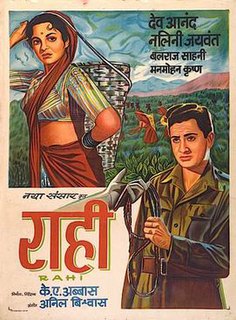 W
WRahi is a 1952 Hindi social drama film produced and directed by K. A. Abbas. The film was based on Mulk Raj Anand's novel "Two Leaves and a Bud" (1937), which was scripted by Abbas. It was produced as a bilingual in Hindi as Rahi and in English as The Wayfarer, under the Naya Sansar banner. Its screenplay was by Mohan Abdullah and V. P. Sathe and the cinematographer was Ramchandra. The film starred Dev Anand and Nalini Jaywant with Balraj Sahni, David Abraham Cheulkar, Achla Sachdev and Manmohan Krishan.
 W
WSaat Hindustani is a 1969 Indian action film written and directed by Khwaja Ahmad Abbas. The film portrays the heroic story of seven Indians who attempt to liberate Goa from the Portuguese colonial rule. The cast included Madhu, Utpal Dutt, Shehnaz, A. K. Hangal, Anwar Ali, and Amitabh Bachchan who made his debut with this film.
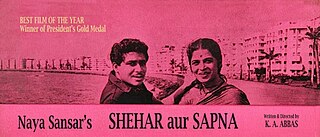 W
WShehar Aur Sapna is 1963 Hindi film directed by Khwaja Ahmad Abbas, about a young couple searching in vain for a home of their own in a metropolis, amidst the backdrop of rapidly developing city, and the many who flocked to it in hope for a better life. It won the 1964 National Film Award for Best Feature Film and was nominated for Filmfare Award for Best Film.